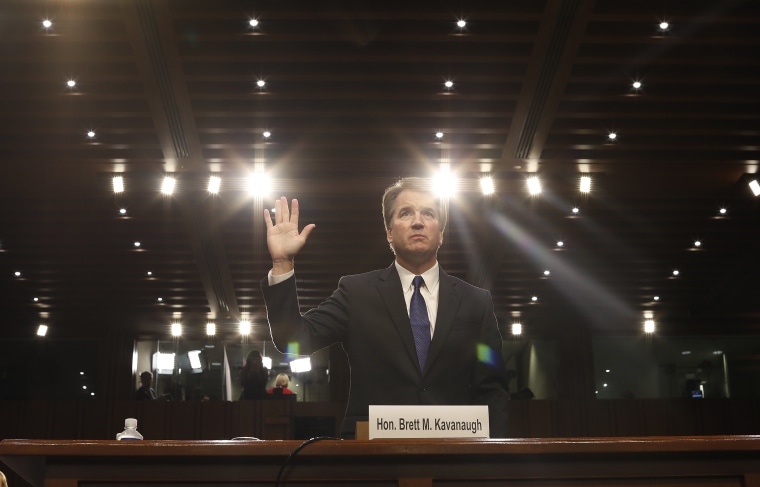For weeks, critics of Judge Brett Kavanaugh's Supreme Court nomination have faced a daunting political reality: to defeat him, opponents won't just need a united Democratic front; they'll also need to persuade some Senate Republicans to oppose Donald Trump's choice.
Some pressed the point that confirming a president's nominee while the president himself is facing a criminal investigation is irresponsible. Republicans promptly ignored that argument. Others insisted that the confirmation process be slowed in order for the Senate to examine all of Kavanaugh's professional record, instead of a small fraction. That argument didn't work, either.
Is there anything that might give GOP senators pause? How about possible false claims under oath?
The New York Times obtained previously unreported documents from Kavanaugh's past late yesterday, and there are some notable revelations in the leaked materials. As we discussed earlier, in 2003, then-White House lawyer wrote an email in which he questioned whether Roe v. Wade should be seen as "settled law of the land."
But that wasn't the only revelation from the leak.
Other documents provided to The Times included a document showing that in September 2001, after the terrorist attacks, Judge Kavanaugh engaged with a Justice Department lawyer about questions of warrantless surveillance at the time that lawyer wrote a memo an inspector general report later portrayed as the precursor to the Bush administration's warrantless surveillance program.On Wednesday, Senator Patrick J. Leahy, Democrat of Vermont, seemed to allude to the existence of such an email, grilling Judge Kavanaugh about whether his testimony at his May 2006 appeals court hearing that he had not seen or heard anything about the Bush administration's warrantless surveillance program before its existence leaked the previous December was accurate.
Not to put too fine a point on this, but if Kavanaugh discussed warrantless surveillance with the Justice Department in 2001, but later said under oath that he didn't know anything about warrantless surveillance, then it's entirely possible he misled the Senate during a confirmation hearing.
And it may not have been an isolated incident.
There have long been questions about whether Kavanaugh lied in 2006 when he told Sen. Dick Durbin (D-Ill.), "Senator, I was not involved and am not involved in the questions about the rules governing detention of combatants, and so I do not have any involvement with that."
We later learned that his denial wasn't exactly true. After Kavanaugh's confirmation, it became clear that he had been directly involved in internal White House discussions on the issue.
Making matters worse, as Rachel noted on the show last night, Sen. Pat Leahy (D-Vt.) turned his attention yesterday to an incident from 2002 and 2003, in which a Republican Senate staffer stole thousands of documents from Democrats on the Senate Judiciary Committee. Kavanaugh, who worked closely with the staffer at the time, said in his 2006 confirmation hearings that he didn't know anything about the theft and leaks of the Democratic materials.
Leahy said yesterday, however, that he's seen unreleased emails that call those claims into question.
At this point, the Vermont Democrat is urging Judiciary Committee Chairman Chuck Grassley (R-Iowa) to release the documents to the public, and we don't yet know whether that will happen.
But taken together, it appears Kavanaugh is facing questions about three separate instances in which his claims, made under oath, may not have been entirely true -- and lying to the Senate is, under normal circumstances, the sort of thing that may adversely affect a Supreme Court nominee's chances of confirmation.
Watch this space.
Update: There's also fresh evidence today that Kavanaugh, in previous testimony, said he was "not involved in handling" Bill Pryor's nomination in Bush's first term, despite having been invited to an "emergency umbrella meeting" at a private law firm "to discuss nominee Bill Pryor's hearing."
On a related note, Kavanaugh testified that Judge Charles W. Pickering “was not one of the judicial nominees” that he was “primarily handling” during his White House tenure. There's reason to believe those comments may not have been true, either.
